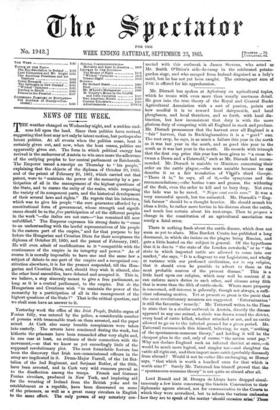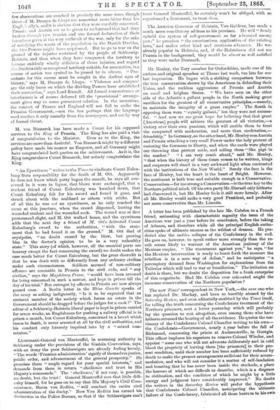Lord Russell and M. Drouyn de Lhuys have dropped simul-
taneously a few hints concerning the Gastein Convention to their diplomatic agents abroad, not for communication to the Courts to which they were accredited, but to inform the various embanks how they are to speak of the matter should occasion atin."1'heae
few observations are couched in precisely the same tone, though those of M. Drouyn de Lhuys are somewhat more bitter than his Eng11.71 ally's, and it is obvious that they were carefully concerted. Prussia and Austria are to b given to understand that had they broken through two treaties and one formal declaration of their intentions given at the very outbreak of the war, only for the sake of satisfying the wants of the population in the Danish Duchies, the two Powers might have acquiesced. But to go to war on the ground of the injuries sustained by the people of Schleswig- Holstein, and then when they have conquered the territory to become suddenly wholly oblivious of those injuries, and regard the Duchies only as conquered territory suitable for annexation, is a course of action too cynical to be passed by in silence. "Pre- cedents for this course must be sought in the darkest ages of history," says M. Drouyn de Lhuys. "Violence and conquest are the only bases on which the dividing Powers have established their convention," says Lord Russell. All formal remonstrance or interference is of course deferred till the ' provisional ' arrange- ment gives way to some permanent solution. In the meantime, the concert of France and England will not fail to strike the Prussian Government, —not the less perhaps that the language used reaches it only casually from the newspapers, and not by way of formal threat.































